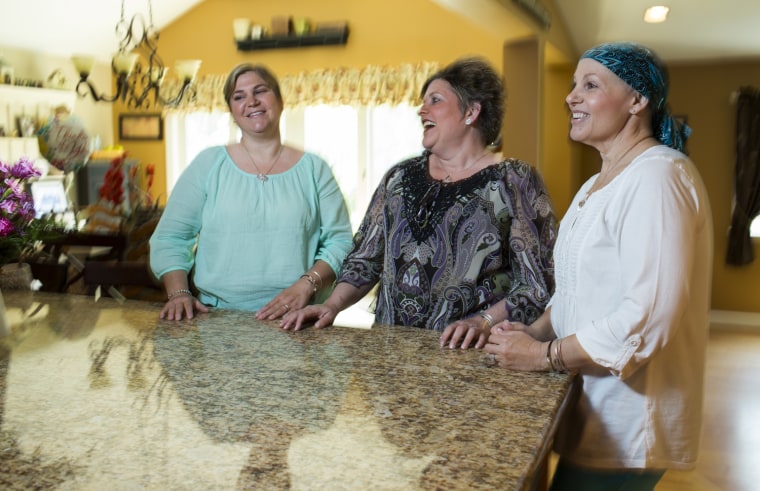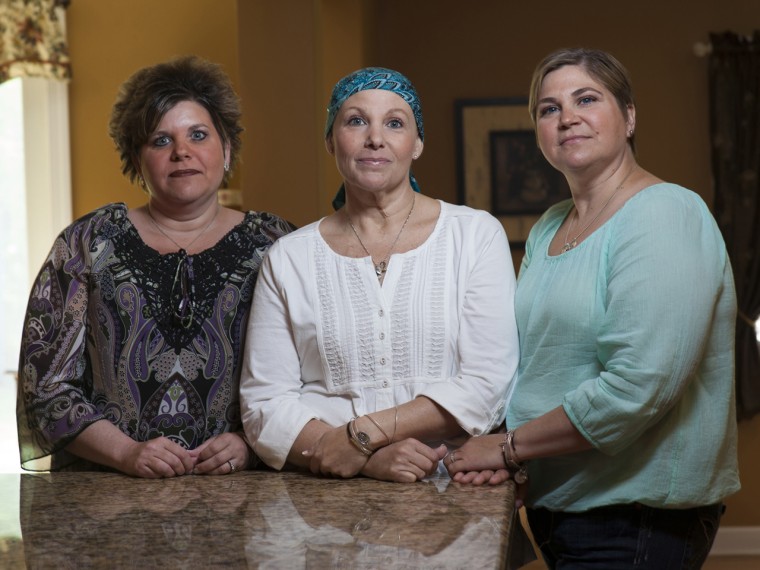Actress Angelina Jolie’s revelation this week that she’d had both breasts removed to lower her elevated risk of cancer came as a bombshell to many -- but not to three sisters from Berkeley Heights, N.J.
The women -- Cathy Balsamo, Cindy Lepore and Patti Broccoli -- have spent most of the past year grappling with the very dilemma that Jolie faced: What to do when a genetic mutation means you’ve got a sky-high chance of breast or ovarian cancer?
“Rich, poor, famous, not famous -- it’s the same decision,” said Balsamo, 46, who was the first to learn last spring that she had a mutation of the BRCA1 gene, which boosts the risk of both kinds of cancer.
“It doesn’t make it easier or harder.”
The family -- which includes the three sisters and a brother, Joseph Zichichi, 48 -- offers an extreme example of the issues now illuminated by Jolie’s spotlight.
Like Jolie, all three women opted for preventive double mastectomies. Unlike Jolie, who’s 37, the 40-something sisters also all had concurrent operations to remove their ovaries. Jolie wrote in the New York Times that she plans to have that surgery later.
“The option of waiting and watching was never an option,” said Broccoli, a 49-year-old nurse. “Why would we wait for cancer?”
Though their mother, Patricia Zichichi, had always warned of a family history rife with cancer -- a grandmother and two great-aunts died young of what was then called “women’s cancer” -- the sisters didn’t know about their actual genetic risk until Balsamo asked her doctor to perform the BRCA test in April 2012.
“He was just so upset and said ‘I hate to have to tell you this,’” recalled Balsamo, who is an activity director at a nursing home. “Immediately, when he said BRCA1, breast and ovarian, I said, ‘I’m getting a double mastectomy and a hysterectomy.”
Within weeks, her sisters had the same test -- with the same results. It’s not surprising that all three women would turn up positive for BRCA mutations, said Dr. Larissa Korde, a breast cancer specialist at the Seattle Cancer Care Alliance in Washington. If one parent carries the defective gene, there’s 50 percent chance any child will get it.
“Sometimes you see it in families where everybody’s got it,” Korde said. “It’s just chance.”
A woman with a harmful BRCA1 or BRCA2 mutation has a 60 percent chance of developing breast cancer during her lifetime, about five times higher than the overall rate of 12 percent, cancer experts say. She has a 15 percent to 40 percent lifetime chance of getting ovarian cancer, compared with about 1.4 percent in the general population.
With those odds, the sisters opted for surgery within months of each other. Lepore, 42, a respiratory therapist who has type 1 diabetes, had her initial and reconstruction surgeries last October. Broccoli had her surgery in January and Balsamo followed in February.
Ironically, Broccoli’s preventive surgery actually may have saved her life. Two weeks after her double mastectomy in January, she was diagnosed with breast cancer -- but at such an early stage her chance of cure is very good. A mammogram and two MRIs before surgery had suggested strongly she was cancer-free, but doctors detected ductal disease after Broccoli's operation.
“I consider it a blessing,” said Broccoli, who lost her hair to three rounds of chemotherapy. “I know what could have happened if it hadn’t been caught early.”
Rates of women opting for preventive mastectomies have risen by as much as 50 percent in recent years, cancer experts estimate. That's despite the small chance of getting cancer anyway, the risk of major surgery and the fact that there are alternatives, including drugs and careful monitoring.
Still, some women who learn of BRCA mutations are devastated by the information -- and by the dilemma of whether to have surgery, Korde said. “I’ve definitely had women who were through childbearing and who feel emotionally conflicted about losing their breasts.”
But the New Jersey sisters aren’t among them. “For me, it was a no-brainer,” Balsamo said. “The good of it outweighed the bad. So I don’t have terrific boobs. I’ll never have nipples. I didn’t have that emotional thing.”

What does make them emotional, the sisters said, is what the genetic legacy might mean for the rest of the family. Joe Zichichi is scheduled to be tested for BRCA mutations soon, too, the women said.
The results could have implications for him in the form of an increased risk of pancreatic, prostate or other cancers, doctors say.
“There’s more to BRCA genes than breast and ovary cancer,” said Dr. Eileen O’Reilly, a gastrointestinal cancer specialist at Memorial Sloan Kettering Cancer Center in New York. “As much as 5 percent of pancreatic cancer risk might be related to BRCA mutations.”
But the family is especially concerned about possible future effects on their children. They all live within a mile of each other; there are 13 grandchildren in the family, including Joe Zichichi’s four daughters.
Two of the granddaughters are in their early 20s. The U.S. Preventive Services Task Force recommends BRCA testing only for women with a strong family history of cancer, about 2 percent of all women in the U.S. But for those with that high risk, testing can be done at age 25.
Whether such young women choose to be tested -- and what action they’ll take afterward -- is something serious to ponder, the sisters said.
“We have a good four years to figure this out,” said Balsamo. “God willing there will be something in that period of time that helps our daughters deal with it.”
It’s not clear when Jolie learned of her genetic risk or how long it took to decide that surgery was the best option. Her decision has prompted a flood of calls and inquiries to cancer centers nationwide, including Korde’s, and to geneticists, said Dr. Michael Watson, executive director of the American College of Medical Genetics and Genomics.
The New Jersey sisters said they’re grateful for the awareness that Jolie’s decision brings to an issue that has become central to their daily lives.
“I was actually very happy,” said Lepore. “In this world, it takes someone like Angelina Jolie to get recognition of important things.”
Related stories:
